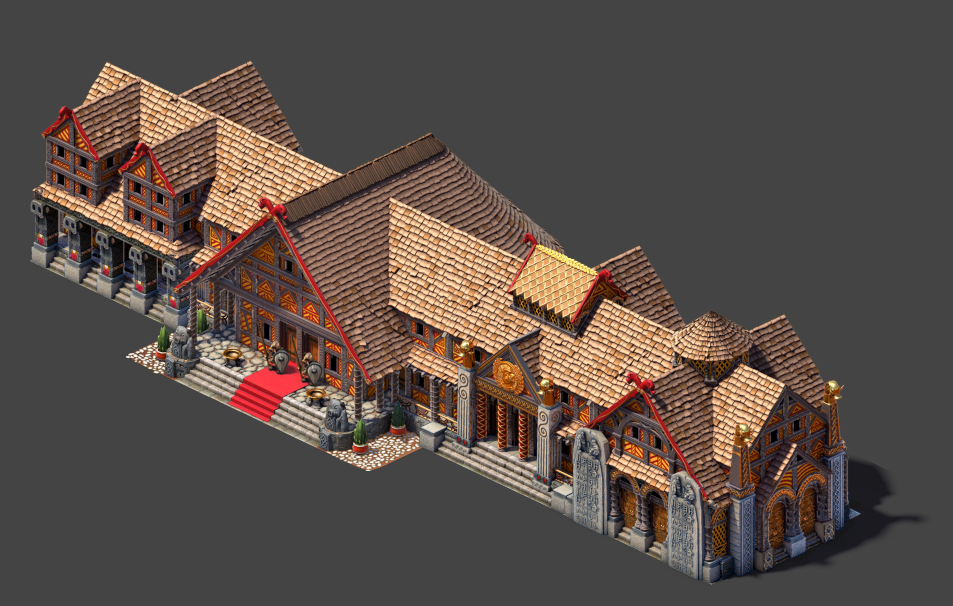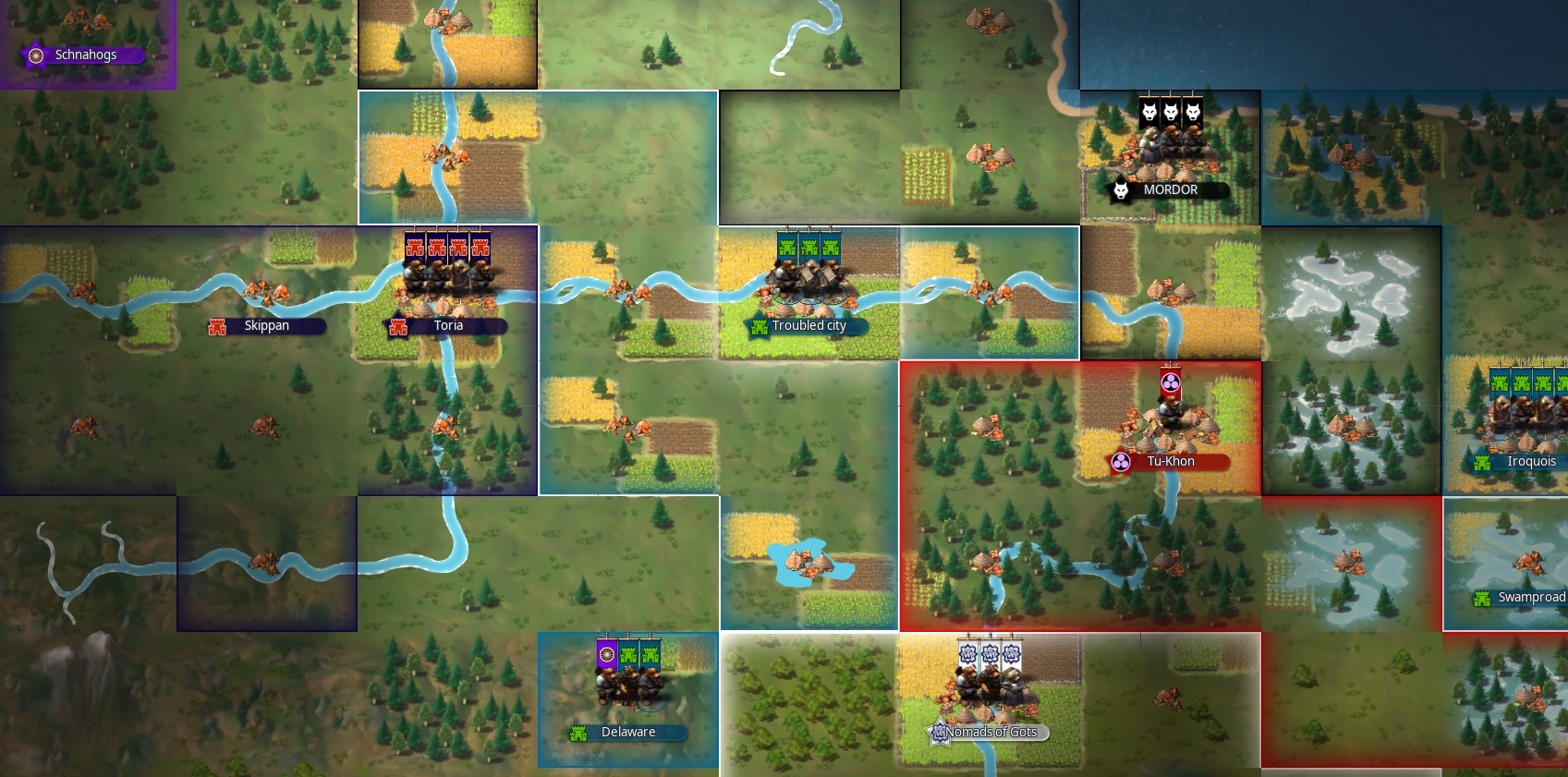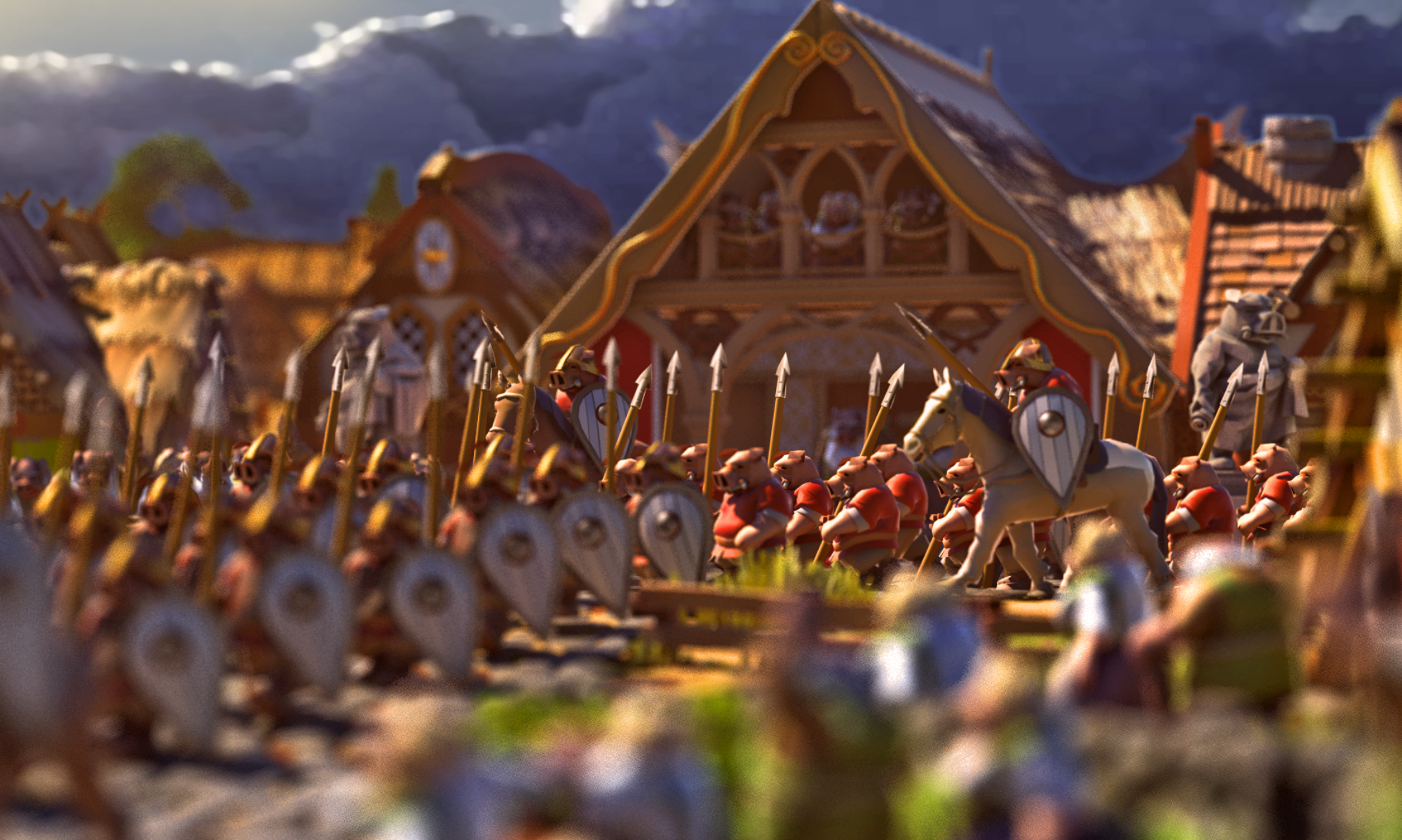This update is the biggest update since the early access release that cumulates more than 9 months of features, exploit-fixes and bug-fixes!
Capital buildings
This update adds capital buildings: some government policies -especially State power ones- now work in tandem with special unique buildings that can only be placed in the capital.
Most State power production now comes from these buildings activity instead of intangible policies, and cities will visually reflect their importance and status: you can grow your capital government from a unique Chief’s hut to an impressive modular palace used to manage an empire whose layout you can design yourself: government buildings are designed to visually connect or to stand on their own.

Nation growth
State power transfers between nation members are entirely removed, as it was a constant source of exploits and multi-account farming.
A reworked government tech tree now also gradually limits the ability to form larger nations: techs can affect the maintenance cost of nation members and limit the max number of vassals.
From being able to ally only with a single State with the “Alliance marriages” tech in early game, it evolves into recruiting multiple members under a same Nation leader, then forming a larger nation with each ranks having its own vassals, and then reducing nation maintenance costs with special capital buildings, administrative techs and new services like Postal relays.
This prevents continental empires formed in the early-game while making it easier in late-game.
There is no more hard-capped limit for State power and in late-game it can be produced by expanding the Palace and employing more officials.
For the capital of the largest Nations, the expensive Great Hall also greatly reduces the maintenance cost of subordinates, allowing for larger expansionist empires.
Regional territories
Another major change are the introduction of regional territories: cities (now ‘regional centers’) can now attach these regional territories to themselves in the same way they could claim empty territories and form regions.
These regional territories can use resources of the city directly to build, saving precious time of not having to constantly switch territories to transfer missing resources. They can also send all their production to the region center for free.
However regional territories are limited in number of buildings and cannot have industries. They are the “countryside” around cities, used mostly to farm and exploit natural resources. Because they can’t be fully exploited due to this limit, having more territories becomes important for production, putting more value to land surface.

Regional centers
Cities are no longer just ‘cities’. They are now regional centers with evolving administrative statuses. Starting with the default “hamlet”, they can grow to village, town , and city. Like how capital have unique capital buildings required to maintain policies, regional centers have unique ‘city hall’ buildings required to maintain their territorial status and producing local administration.
These territorial statuses are notably what allow a regional center to control more regional territories and claims.
Trade routes and cargo
Trade routes and cargo, as a redundant system to market trades, has been removed and retro-fitted into the regional transfers mechanic.
There is no more cargo, and transfers are one way between region territory to the regional center it belongs to. You no longer set a fixed amount of transfer but rather a maximum limit, and every unused production will be automatically transferred, making it less tedious to manage. No more quantity adjustments, no more breaking routes because of cargo, no more price shenanigans or manipulations as the price of the “trade route” is simply aligned to the local price.
Legitimacy and Oligarchy
A new class, Oligarchy, is introduced and at the center of important new game mechanics: Oligarchs represent all the rich, powerful and influent members of the society whose support is required to legitimize your rule.
Legitimacy factors and policies have been reworked, introducing Oligarchy support as a major factor.
Their support is determined by the effect of various policies, but mostly by their status of dominance: their wealth and life quality has to be above the average population to retain their favors. To do this the first basic way is to pay them with hefty political bribes.
Community work
Gift economy no longer allows for limitless spending, killing its associated exploits.
It now comes with a new “community work” policy, which represents the percentage of time the members of the tribe will allocate for the tasks of the community such as maintaining huts, palissades or going on expeditions.
Now gift economy also has a budget like in post barter, including building and formation maintenances.
However because there is no storable physical form of money yet, so you have to maintain permanent balance between your available community workforce and the expenses requiring it.
Tributes
In the barter era, things are changed as well. There is no more “voluntary contributions” proto-taxation.
Instead, there is a new “tributes” policy allowing the government to seize a portion of all produced cattle and agricultural foods (making them ‘state owned’), mimicking early pre-currency societies where food itself was taxed by governments and then used as payments.
Actual taxation only comes later with currency and coinage.
Economy fixes
This update is filled with countless economic bug-fixes and balance changes to counter exploits such as price manipulation and waste-avoidance.
Loading resources with formations is now subject to waste even if state owned to definitively kill the advantage of having to tediously manually transfer goods to avoid waste.
Production costs are saved to prevent the old “stop production buy low, restart production sell high ” exploits.
Prices also have strong inertia to changes to make price manipulation exploits much harder.
Officials and State employees
As unprofitability now applies to all types of buildings and as State power and administration comes mostly from actual buildings and not policies, there is now much more government employees and not paying them is not an option.
Additionally, officials behave a bit similarly as Oligarchs that they need their wealth and life quality to be above average to keep the temptation of corruption in check: a new waste modifier for “officials corruption” can add -or remove- 25% of waste in territories depending on their wealth. This will require to divert substantial wealth to them as privileges, or to pay costly salaries.
Despotism, Democracy and Republic
New policies allow players to customize their type of government a bit more and to give it more flavor.
A set of Despotic policies increase your Authority, allowing you to counter all the loyalty penalties that the high privileges and tributes generate (which you’re often forced into in the early game at least).
Later in game, players who wish to remain city-states can give up Leadership for “Democracy” in the fashion of ancient Greek cities, unlocking the special Agora government building and gaining a bit cultural boost.
The “Republic” policy allows for the Senate building, and rebalances Legitimacy factors.
City states
Everyone is now a city-state until at least the Bronze age where developments in administration and governance allow for the management of multiple regions (and thus multiple ‘cities’).
The Democracy option then gives a perk to those who wish to remain as city-states even in the later ages.
In the first age, all players are bound to their capital and its surrounding territories.
Player life-quality features
- To increase life quality for players, formations can now “prospect” tiles from the worldmap and get a list of all its natural resources. The result is also saved (although locally on the device) so that selecting the tile later on will display the list of known resources discovered on it.
- Additionally, a new “scavenging” action permits you to directly exploit these resources with formations to immediately retrieve small quantities of it, which is especially useful to gather plant seeds for agriculture: players no longer have to make temporary settlements for it.
- Hunts now auto-resolve so that players don’t have to wait for the ‘battles’ to resolve, saving time.
- Evacuation of cities is changed to make it easier and less problematic to migrate: you now need an established outpost first, and then select the destination when evacuating. Once the event completes, all your city is evacuated: no more migrant formations causing maintenance and support issues.
New Victory conditions
Victory conditions have been simplified and reworked to prevent stale games and make future balancing easier.
No more “victory points per score”. Instead, it works in “reward cycles” where at the end of every cycle, the players meeting victory conditions earn a Victory Point reward.
For now, the main condition is “hegemony” where about every day (in persistent speed) the leading nation is simply awarded 1 Victory Point.
This gives players a clear deadline and visibility on the game’s progression as well as making it more feasible for competing Nations to challenge the leading one: instead of having to destroy it -and most others- to win, they now just need to close the gap and take the lead themselves which is easier to envision.
It also allows to end stale games quicker, as cycles will shorten with time and with player inactivity.
Colonies
Colonies are removed until they can be properly reworked, due to be being at the center of too many exploits and due to the new features causing too many problems with colonies.
The biggest update
v0.4.0.x
– reworked “market study” price factor to reduce volatility for very small distributed amounts
– replaced oceanic ambiant sounds
– bath and theater services both generate +1 culture
– Academia service culture increased to +4 culture
– school service culture increased to +2 culture
– “Capital” is no longer a territorial status but a property of a territory
– removed old policies of “governors”, “senate” and “parliament”
– added policy requirements in the policy info UI
– policies no longer meeting requirements will now auto-disable themselves.
– added new territory status of “hamlet”
– added new territory status of “village”
– added new territory status of “town”
– added new “oligarchy suppot” legitimacy factor
– rebalanced all legitimacy policies & legitimacy factors
– added new Oligarchy dominance calculation based on their wealth compared to average wealth
– added “aristocracy” policy, enabling privileges for Oligarchs
– removed colonies
– lowered loyalty from population to +/- 75 instead of 100.
– added “community work” policy, allowing for a new primitive source of ‘income’
– implemented a gift economy workforce-based ‘money’
– added possibility to cancel ongoing projects
– “insolvency” event when negative budget in gift economy: triggers auto abandon of buildings, units, policies & projects
– primitive tribe rebellions will now be of anarchic faction instead of barbarian, making it a valid spawn point if they win.
– added mechanic of buildings required to enable and maintain policies.
– added new building “community hall” required for the “village” territorial status.
– added new building “town hall” required for the “town” territorial status.
– added new building “city hall” required for the “city” territorial status.
– leadership project now triggers the leadership mission instead of knowledge, and it’s the mission that awards the knowledge.
– adding mechanic of event choices having possible conditions
– adding new event of nomad traders giving shells
– increased efficiency of water collectors but increased min range as well
– removing civilians from primitive tribe rebellions
– primitive tribe rebellions will now be of anarchic faction instead of barbarian, making it a valid spawn point if they win.
– lvl 1 fisher efficiency reduced by 50%
– more lvl1 buildings can be moved for free (ex woodcutters)
– added auto resolution of hunting actions
– updated spawning process of NPC units on the worldmap
– added prospection action to list discovered natural resources of a territory
– added scavenge action to get chances to gather a selected natural resources from wild territories
– added huntable fish formations on sea tiles
– added a cooldown time for territory exploitation actions (scavenging, wood)
– removing unclaim penalty
– increased AP cost to claim
– increased admin cost of extra claims
– claiming now requires an adjascent region-center or at least 2 adjascent territories of the same region and cannot claim diagonally
– added new territorial status of “regional territory”
– regional territories can build using resources of the regional capital directly
– rebalanced authority from stationned troops to be factored by total population of the territory
– added mechanic to limit the number of building per category based on territorial status
– removed cargo buildings (until re-implementation in future updates)
– retrofitted cargo trade routes system into regional transfers for sub territories
– reduced farms efficiency gain in level upgrades
– reducing efficiency of fields from 1 to 0.65
– tech “manure fertilizing” now gives +0.1 base efficiency to fields
– removed State power transfers in nations
– waste is now applied even to state owned resources when manually loading resources into formations.
– added nb of max regions limit (cities) and ‘regional administrations’ tech & policy that unlocks it -> forcing city-states until this tech
– added automatic territorial status regression if status conditions are no longer met (ex: village needing community hall)
– territories are now evacuated by events with a selected destination instead of spawning “migrant” formations
– modified houses building materials to make mudbricks and lvl2 comfort house more relevant.
– lowered wealth production of trading service
– added memory diagnostic tools for debugging
– all buildings can now be moved, for some cost in materials
– added new capital building “chief’s hut” required for “leadership” policy
– added new capital building “great hall” required for the “court” policy
– added new capital building “treasury” required for the “treasury” policy
– added new capital building “agora” required for the “democracy” policy
– added new capital building “lawmaker’s hall”
– added new capital building “state archives”
– added new capital building “state department” producing extra State power
– added new building “postal relay”
– added new policy “tributes” that allows to tax a portion of produced food & cattle, making them state owned.
– added new animations for buildings
– added mechanic of Nation maintenance cost being influenced by active policies.
– added new “alliance marriages” tech & policy allowing for 1 nation subordinate.
– added new “diplomatic treaties” tech & policy allowing for unlimited nation subordinates.
– added new “tributaries” tech allowing for the “subjugation” action.
– added penalty when over the maximum limit of subordinates.
– added new “republic” tech & policy
– added new “democracy” tech & policy
– added new “treasury” policy
– added new “court” policy
– added new “lawmaking” policy
– added new “council” tech & policy
– blocking contruction + UI warning for buildings missing a cultural trait (ex Baths )
– warriors damage +1 and attack skill +0.2
– added max nb of claims limit per territory status
– added auto unclaiming of territorial claims that are disconnected from their regional center
– damage bonus from height capped at +/- 3
– new victory points system now based on reward cycles
– added “internal only” trade offers to markets
– only the nation leader can have subordinates until the new “vassalage” tech is known
– increased range of chronicles
– addedfaisafe when full inventory for collecting actions (hunts)
– civilians gained in exploration events now received as a separate special “migrant” formation that costs no upkeep.
– +0.1 efficiency of woodcutters lvl 1 and 2
– increased tree clumps minimum density in spawn territories (ex arid starts)
– larger ponds on arid & desertic spawn territories
– removed “permanent” treaties: all treaties now have a duration limit after which they can be broken without penalties.
– added inertia to nation score variations to prevent reward cycle last minut exploits
– rebalanced resources per herd unit
– added missing fish unit icon
– added cosmetic dogs appearing in cities when tech “domestic dogs” is known
– disabled colonies
– increased woodcutters to 3 workers and production range
– increase lvl1 potter to 1.2 efficiency
– fields size increased to 8×8
– pastures size increased to 12×12
– removed gathering actions for “migrant” formations
– olives & grapes pleasure food quality reduced to 0.5
– olives distribution rate increased to 60 rations per unit
– removed “representative money” policy
– culture from services: reducing state power to 0.3. increasing justice to 1. increasing theatre to 3.
– modified tech requirements for road types to make it more progressive
– currency policy building efficiency reduced to +10% but now provides -15% conflict
– increasing fertility of poor ground to 2.5. decreasing fertility of fertile ground to 3.5
– added “tribal council” policy, needed for tribal councils
– added “code of laws” policy, needed for magistrates
– elephants and mammoths are now untradable in markets
– reduced wealth of leather to 0.03
– production & service buildings are now affected by unprofitability
– price arbitrage removed for services
– implemented free resources (water & some services like administration or community)
– state salaries now available since barter
– added “Officials” to the “privileges” policy
– added new waste factor of Officials corruption –> Officials wealth level now affects waste rate +/- 25%
– included treasury in monetary supply -> wealth per coin is now lowered by total treasury
– included state resource sales and exportation profits to the GDP calculation
– added decimals to population classes wealth
– added UI details about monetary unit value in Population wealth
– territory menu: ordering pop classes by wealth and removing sows/piglets/oldpigs.
– guard tech now available from Leadership
– ignored militias for military power & ‘protector of the people’
– added increased loyalty penalty from privileges (“privileges tolerance”) to the currency policy
– changed first tavern building requirements to unlock earlier
– currency and coinage now provide -10% waste effect each
– added separate salary setting for Officials in the state salaries policy
– added “banditry extortion” policy, trading authority for income.
– added “night terror patrols” policy, increasing state troops authority
– added “summary executions” policy, increasing authority
– added “Nepotism” policy, trading conflict for oligarchy support
– reduced gold in adornments by 5
– added penalty when revoking currency
– added strong inertia (about +/- 1 per eco cycle) to price changes. prices slower to move down than up.
– removing “‘importation price” influence in price calculations
– mines +2 workers per building
– worforce per tree reduced to 0.012 from 0.016
– claycamps +1 worker + increased range
– mudcamps +1 worker
– fixed issue with device ID causing a false positive device ban
– fixed bug of double taxation incomes on market sales
– fixed bug allowing to delete defensive zones in territories not controlled
– fixed calculation error in bonuses from cultural skills of annexes
– fixed exploit of selling at a loss in markets to avoid waste: wasted income set to local price instead of sold price as a minimum.
– fixed marshalls being able to unclaim territories of army owner
– fixed bugs in resource state sales calculations
– fixed selling state owned goods giving 100% of income to the state despite the 25% merchant share.
– fixed issue with lvl3 needs having incorrect satisfaction value allowing for lvl4 needs without actual lvl3 satisfaction
– fixed bug causing 0 produced wealth in territories.
– fixed bug with population service access having incorrect values (ex Health services)
– fixed issue with resource wealth is lower than the sum of cheapest materials
– fixed bug with material supply/demand having incorrect value due to other missing materials in industries
– fixed bug of war state reset as neutral after server restarts
– fixed rounding issue in “importation cost” of the Price calculation with regional transfers
– fixed bug with production costs when removing materials from city inventory -> production cost can only lower if resource in being produced
– fixed grape fields being too productive
– fixed issues in market study in regional transfers
– fixed recurrent server & client crashes due to buffers
– fixed importations going into stock not being state owned
– fixed bug in auto-distribution of goods (gift eco) being higher than max demand
– fixed bug with trade income predictions and rounding error of state ownership.
– fixed loss of mission events when spawning as a “succession” type
– fixed bug with production annexes remaining productive when building is asleep
– fixed bug of some new cultural customs missing from the UI
– fixed bugs with industry materials in gift economy (autodistribution)
– fixed bugs with auto-selection of materials for industries

